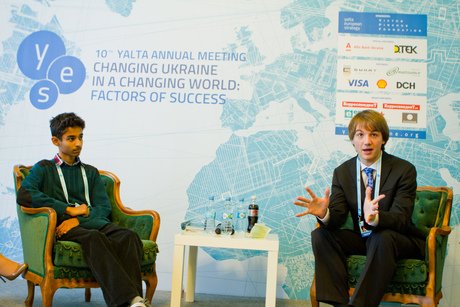I was there with Daphne Koller, an Israeli-American professor at Stanford University and Michio Kaku, an American theoretical physicist, and a few more! I left my house in Pakistan on Sept. 17 and headed for Tashkent, Uzbekistan. We exchanged dollars for their currency and we became millionaires because $100 is 214,670 Uzbek soums!!!
Thus it was not fitting in my father’s wallet and it was tiresome to count. Even the shops had counting machines. One Coca-Cola is 4,000 soums. Why can’t they have giga-soum note? That would be awesome. I wonder why their currency is so devalued. The prices are still high, so it makes no difference. Instead of wallets they have briefcases. Strange and silly.
Finally we made it to Ukraine’s Simferopol. A van picked me and my family up and took us on the drive to Yalta. Yalta in three words: beautiful, amazing, breathtaking. Then we went to the welcome dinner. So the next day I was supposed to speak at the panel. I was very inspired by the views given by Koller and Kaku.
Koller is a really remarkable lady and the work she is doing is really amazing. And who else knows the worth of her work like I do, because I have completed 10+ courses from Coursera, the online education system, and got a learning experience which I could not have gotten at my age (if I used the normal school system).
No wonder Ukraine’s overall literacy rate is 99.7 percent and this clearly showed in their culture and in their country. You can see the progress of Ukraine by looking at the condition of the country. Even though I didn’t see many people talking in English, they were still talented and educated in their own unique way.
As far as Pakistan is concerned, it is still struggling to cross 60 percent in literacy rate and yet we call ourselves a nuclear power. And still the electricity we produce by nuclear power is 5.3 percent, whereas Ukraine produces 46.2 percent of electricity by nuclear power. This is strange because we have an extreme power shortage in Pakistan and we have 12-13 hours of (blackouts daily). And here we are, not even utilizing our nuclear resources for the production of electricity.
The exciting part came when Ukrainian member of parliament Petro Poroshenko and Russian official Sergei Glazyev had “The Great Debate.” Poroshenko was talking in English but every time Glazyev spoke, I had to quickly put on the translation headphones so that I wouldn’t miss his reply. They were debating on CHOCOLATE! 🙂

Poroshenko reminded him that Ukraine’s chocolates are the best but then Glazyev begged to differ and said: “But if someone can find cocoa in Ukraine, it will be a new word in botany.”
And I can very well imagine Poroshenko’s anger when Russia stopped importing his chocolates. It was really interesting to hear Glazyev warning Ukraine about joining the European Union and hearing Poroshenko’s optimistic replies. It was a peculiar sight when Stephen Sackur, the presenter of BBC’s “Hard Talk,” tried to mellow out his debate.
I was very proud that I represented my country Pakistan. I hope Pakistan will strengthen their ties with Ukraine. There is so much they can achieve together. Pakistan should work with Ukraine on the education sector and seek advice on how to achieve a 90 percent literacy rate. They can also help in building power plants.
Khadija Niaza, 13, lives with her parents in Lahore, Pakistan, and is a high-achieving student who has completed eight courses through Coursera, the online education program. The article is adapted from her blog here: http://world-studies-with-me.blogspot.com/2013/09/yalta-european-strategy.html
